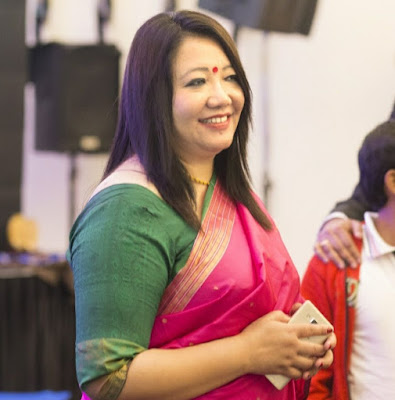
Laxmi Limbu Kaushal: A woman’s story in a man’s world
 |
| Laxmi Limbu Kaushal |
EOI, Prashant Acharya, SILIGURI, 25 May 2017: It is the little things in life that hold the potential to bring about drastic changes in our lives. When Laxmi Limbu Kaushal realized that even though women comprised 60 per cent of the workforce in tea plantations but not a single woman had ever held the position of manager, she was shocked. It was then that she resolved to rectify the situation and that is how India got its first woman planter in the industry.
Starting her career with the Seeyok Tea Estate as an junior assistant manager in March 1997, Laxmi went on working in various tea gardens for 10 years before she went on to head the Confederation of Indian Industries in North Bengal.
Over the years Laxmi had developed a routine of visiting her brother-in-law Prem Tamang who was a tea planter. She stayed with him during her summer vacations and checked out the fields, factory and tea making and tasting process. The lack or total absence of women in the administrative departments got her wondering about the gender bias in tea plantations. Women are never seen as capable of handling large populations of labour, the arduous factory work, the strange timings, and remote locations that make up the life of a planter. She rose to the challenge at hand and approached late Brij Mohan, a veteran planter and director of Tea Promoters Private Limited. Her exuberance won him over and he sent her to the National Institute of Tea Management for a one-year course. She proved herself a star student and was awarded a gold medal for her performance. Mr Brij Mohan decided to recruit her as a tea planter then and the rest was history.
Laxmi was able to maintain a lead from the very first day though meted out with unprecedented challenges of facing a gherao all alone even as male workers brandished naked ‘khukuri’ (the traditional Gorkha knife) at her. Instead of cowering, she came out of the situation unscathed but more determined than ever. She had already proved a point to her in subordinates that it wasn’t a gender oriented field as has been made to appear thus far.
Her colleagues were a different story. Even after the gherao, she had to fight at every step to make the men accept a woman’s authority. Even her senior colleagues would ask her to do light work. They too were of the opinion that women couldn’t be good planters given the nature of work. She insisted on being given equal work at par with her male colleagues. Her work meant visiting the garden factory sometimes around midnight, confronting garden workers who were not always sober, and trekking for hours around difficult terrain to oversee fieldwork, whether in rain or sunshine. Slowly the acceptance came but Laxmi always had to work twice as hard as anybody else just to make sure that she wasn’t being judged by her gender.
However, Laxmi doesn’t fail to acknowledge the role of men in her life. She gives them due credit for her success both in personal and professional life. Within a year of joining the garden she had to learn driving an open jeep across the hilly garden terrain. In fact, it was the male workers at the garden factory who patiently taught her to ride a bike in the hills before she started driving her jeep. She fell down innumerable times but they always helped her up. To many it may not seem something of consequence but for Laxmi it meant a great deal. Finally she had come to belong and she knew it.
Ever since tea gardens were set up in the Darjeeling hills from the 1850s, assistant managers have been addressed as Chhota Sahebs and managers as Bara Sahebs. She was the one who changed this forever. For her it was a proud moment when she was introduced as Chhota Saheb Madam in a crowd of all male supervisors, assistant managers, and managers. According to her, a woman’s ability, confidence and toughness have always been doubted and every time these doubts must be cleared with determination and dedication. Women have to convince it is the work that matters and not the gender.
Born to a police officer, Laxmi maintained discipline in her life and this discipline showed right through her career too. In an otherwise male dominated job, she carved a niche for herself. She is the kind of person who considers every job that comes towards her as a challenge. It’s no wonder then that she has turned out to be so successful in her life.


0 Response to "Laxmi Limbu Kaushal: A woman’s story in a man’s world"
Post a Comment
Disclaimer Note:
The views expressed in the articles published here are solely those of the author and do not necessarily reflect the official policy, position, or perspective of Kalimpong News or KalimNews. Kalimpong News and KalimNews disclaim all liability for the published or posted articles, news, and information and assume no responsibility for the accuracy or validity of the content.
Kalimpong News is a non-profit online news platform managed by KalimNews and operated under the Kalimpong Press Club.
Comment Policy:
We encourage respectful and constructive discussions. Please ensure decency while commenting and register with your email ID to participate.
Note: only a member of this blog may post a comment.